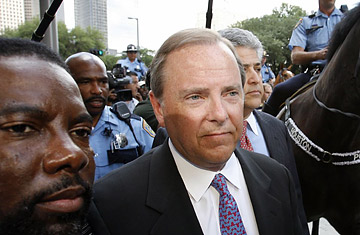
Former Enron CEO Jeffrey Skilling leaves the Bob Casey U.S. Courthouse in Houston with his attorney Daniel Petrocelli after his fraud and conspiracy trial on May 25, 2006
(2 of 2)
One of the other cases the court has accepted comes from Conrad Black, the former newspaper magnate who was convicted two years ago of defrauding his own media company, Hollinger International, by falsely claiming more than $6 million in fees. Black, who maintains that the fees were owed him, says the fraud law shouldn't apply to him because prosecutors weren't required to prove that he intended to harm his company. The other case is from Bruce Weyrhauch, an Alaska state legislator who was convicted of seeking work from a firm that had business before the legislature. He says the fraud law shouldn't be used in a corruption case when no violation of state law was claimed. In other words, his behavior may not have been entirely upright, but it wasn't illegal, at least not in Alaska.
Eric Sussman, a former U.S. Attorney who led the prosecution of Black, doesn't believe the law is being overused. "There are very few cases that show the type of abuses the court seems to be worried about," he says. And that would include the prosecutions of Skilling and Black. "Those were significant cases, significant crimes no matter how you slice it," says Sussman, who is now an attorney with the firm Kaye Scholer. "They're bad examples to raise for people who want to say that honest-services fraud allows prosecutors to criminalize little white lies."
If the fraud statute really is being overused, it wouldn't be the first time a part of the criminal code has taken on a life of its own. In the 1980s it was RICO, the Racketeer Influenced and Corrupt Organizations Act; the law was passed in 1970 to fight organized crime but gradually evolved into a hugely popular way to bring charges against people who would never end up as one of the Sopranos. Federal prosecutors used RICO to indict the financier Michael Milken. Private citizens used it in civil suits against targets like Major League Baseball and pro-life demonstrators who blocked abortion clinics. It didn't hurt that in civil suits a RICO victory brought you triple damages.
By the end of the 1980s, RICO was one of the most commonly cited claims in federal courts. But in the decade that followed, those courts, following the lead of the Supreme Court, repeatedly scaled back the ways that RICO could be used, especially in civil cases. Though it is still applied today against individuals and businesses that don't have Mob ties, it's used much more sparingly.
Although honest-services fraud hasn't become nearly as popular as a RICO claim, it too may be in for a bit of a trimming. If that happens, some high-profile public corruption cases may become harder to win. For starters, honest-services fraud is among the charges against former Illinois governor Rod Blagojevich.
Then again, even if the law were thrown out entirely by the Supreme Court, would it really be so hard to make the case that a guy caught on tape trying to sell a Senate seat was doing something wrong?
